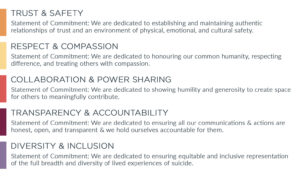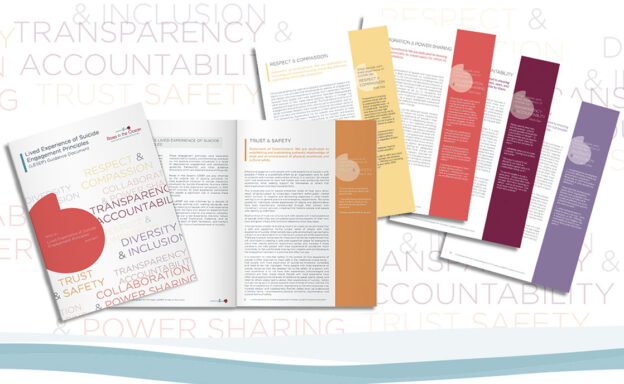Lived Experience of Suicide Engagement Partnership and Integration
These Guiding Principles have been produced to guide staff and organisations intending to or already, engaging and partnering with people with lived experience of suicide in suicide prevention related activity. They set out the foundational principles of safe, effective, and sustainable engagement and partnership, and have been specifically developed to be used in conjunction with six other key Roses in the Ocean guidance documents which collectively support lived experience informed culture change.
The Lived Experience of Suicide Engagement Principles are building on the initial guiding principles developed in 2016, which can be found here.
Guiding Principles

It is also vital that a shared understanding and appreciation of the meaning and value of lived experience is developed across organisations and within internal project teams. The core concepts articulated in these guiding principles can be summarised as a set of key messages:
- Lived experience of suicide is unique, complex, and multi-layered
- Approximately half the people who die by suicide have not been diagnosed with a mental illness
- Suicide does not discriminate – it impacts people of all walks of life
- Humility is a powerful bridge to greater understanding and more effective solutions
- It is imperative that we match the nature of lived experience of suicide to the purpose of an individual initiative
- Lived experience expertise is more than just sharing a story – it is grounded in a sophisticated ability to utilise insights with meaning and purpose
- To enable the full breadth and diversity of lived experiences to be represented, it is necessary to adequately resource individually tailored, culturally appropriate mechanisms for engagement and participation
- Power imbalances are real and must be named and acknowledged before they can be rebalanced
- People with lived experience are profoundly resilient and thrive in cultures of respect, compassion and collaboration
- It is important to consider and understand the benefits of both internal and external lived experience expertise
